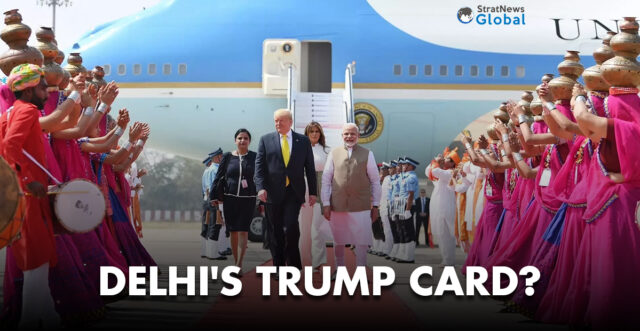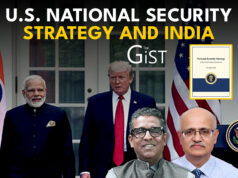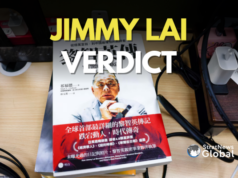
With Donald Trump now formally set to occupy the White House again, it is worth visiting a document called Mandate for Leadership 2025, The Conservative Promise.
Better known as Project 2025, the 922-page tome, often described as the Republican manifesto, aims to ‘Reshape the U.S. federal government to support the agenda and ideologies of the Heritage Foundation,’ a conservative thinktank.
‘This book, this agenda, the entire Project 2025 is a plan to unite the conservative movement and the American people against elite rule and woke culture warriors,’ says the foreword to the paper, which was described as a must read for all students of foreign policy by ambassador PS Raghavan, Chairman of National Security Advisory Board, in this absolutely must watch interview on The Gist, StratNewsGlobal’s flagship video programme.
Here’s a few things that stand out if we set aside the incredibly dramatic and far-reaching domestic agenda outlined in the document, and look only at what it aims for in terms of foreign policy and relations with not just nations (particularly India), but global institutions.
To start with, a quick search of the document shows that if you leave out the two mentions of ‘Indiana,’ ‘India/Indian/Indians’ is mentioned 81 times.
‘Russia’ and its derivatives get 108. ‘Israel’ (including ‘Israeli’) is mentioned only 10 times. Europe and derivatives: 72.
‘China’ on the other hand, crops up 481 times, ‘Chinese’ gets another 173, and PRC yet another 25. .
This is not surprising, given that the paper repeatedly stresses that China is the main concern and focus for the United States, and nothing else should be allowed to divert attention from it.
One of the main weapons that Trump plans to use against the People’s Republic is of course tariffs, aimed at taxing China of business.
The paper recommends that the U.S. ‘strategically expand tariffs to all Chinese products and increase tariff rates to levels that will block out ‘Made in China’ products, and execute this strategy in a manner and at a pace that will not expose the U.S. to lack of access to essential products like key pharmaceuticals.’
It should also ‘systematically reduce and eventually eliminate any U.S. dependence on Communist Chinese supply chains that may be used to threaten national security such as medicines, silicon chips, rare earth minerals, computer motherboards, flatscreen displays, and military components.’
This obviously resonates well with the babus of South Block in New Delhi. Because it not only implies a stronger security relationship with the U.S. (more weapons, technology, intelligence and other inputs), but could also have an economic bonus as multinationals that exit China and look for another place to invest.
When it comes to the Indo-pacific region, ‘continuing to advance the bilateral relationship with India to mutual benefit is a crucial objective for U.S. policy. India plays a crucial role in countering the Chinese threat and securing a free and open Indo–Pacific,’ the paper notes. ‘It is a critical security guarantor for the key routes of air and sea travel linking East and West and an important emerging U.S. economic partner…’
Hence, ‘the priority for statecraft is advancing the U.S.–Indian role as a cornerstone of the Quad, a cooperative framework including the U.S., India, Japan, and Australia,’ the document says. In other words, give the Quad, and by extension India, more teeth.
But India’s reasons for celebrating Trump’s return to the White House go beyond just aligning policy against China. There’s Pakistan too.
‘Pakistan is a prime example of foreign aid policies disconnected from U.S. national interests. The country has been the recipient of more than $12 billion in U.S. foreign aid since 2010, yet it remains intensely anti-American and corrupt, has backed the Taliban continuously since 2001, jump-started North Korea’s nuclear bomb program, brutalizes its religious minorities, and is a willing client of China while taking on unrepayable loans from the U.S. taxpayer-funded International Monetary Fund and World Bank,’ the paper notes.
‘Meanwhile, the threat of transnational terrorism remains acute. The humiliating withdrawal of U.S. troops from Afghanistan after a 20-year military campaign has created new challenges. It has provided an opportunity to reset the deeply troubled U.S.–Pakistan relationship and reassess U.S. counterterrorism strategy in the region,’ it says.
‘While American statecraft should also seek to improve bilateral relations throughout the region, U.S. policy must be clear-eyed and realistic about the perfidiousness of the Taliban regime in Afghanistan and the military–political rule in Pakistan. There can be no expectation of normal relations with either.’
Days before the November 5 election, Trump’s Diwali message, where he pledged to take up the cause of Hindus being persecuted in Bangladesh, becoming the first major world leader to even raise the issue, was icing on the cake.
No doubt, Trump will also raise the issue of tariffs with India, like he did in his last term, and this could hit India’s IT, pharma and textile industries. Tightening immigration laws would add to this problem. But India Inc seems confident about negotiating its way around this. Expect deals, not diplomacy.
But those who think the relationship is well on its way to achieving Best Friends Forever status, particularly given the personal chemistry between Trump and Prime Minister Narendra Modi, should not hold their breath.
Apart from tariffs, issues like Gurpatwant Singh Pannun, the New York based Khalistani who was apparently targeted by Indian agencies, still remain. Climate change is another issue where the two sides will probably have to agree to disagree. And of course, issues like India’s relationship with Russia, and its membership of BRICS, could become real irritants.
Nevertheless, New Delhi believes that a Trump White House is likely to be a net positive for the bilateral relationship.
Provided, of course, that Trump plays by the script.
In a career spanning three decades and counting, Ramananda (Ram to his friends) has been the foreign editor of The Telegraph, Outlook Magazine and the New Indian Express. He helped set up rediff.com’s editorial operations in San Jose and New York, helmed sify.com, and was the founder editor of India.com.
His work has featured in national and international publications like the Al Jazeera Centre for Studies, Global Times and Ashahi Shimbun. But his one constant over all these years, he says, has been the attempt to understand rising India’s place in the world.
He can rustle up a mean salad, his oil-less pepper chicken is to die for, and all it takes is some beer and rhythm and blues to rock his soul.
Talk to him about foreign and strategic affairs, media, South Asia, China, and of course India.




